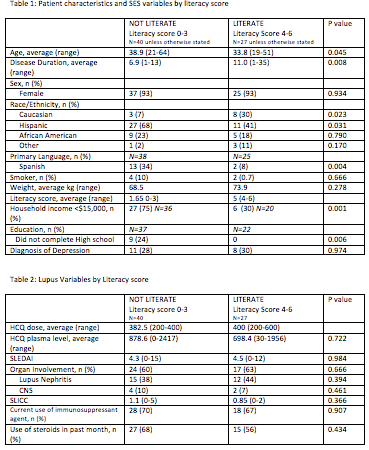Session Information
Session Type: ACR Poster Session C
Session Time: 9:00AM-11:00AM
Background/Purpose: Low health literacy has been associated with poor health outcomes and increased hospital admissions. Adherence to medication has been shown to significantly impact mortality, morbidity, and health care utilization in SLE. The relationship between medication adherence and health literacy has not been evaluated in SLE. Accordingly, the current study aims to assess the relationship between health literacy and adherence to HCQ in a multiethnic, urban SLE population.
Methods : SLE patients from the Columbia Lupus Center meeting ACR/SLICC criteria, treated with HCQ for >6 months, that had self-reported adherence, were included in study. Health literacy was assessed in English or Spanish using the validated Pfizer Health Literacy Questionnaire (HLQ), ÒNewest Vital SignÓ. Limited health literacy is defined as an HLQ score of 0-3, and adequate health literacy as a score of 4-6. HCQ testing was done by high performance liquid chromatography on whole blood by Exagen Laboratory. Adherence was defined as a HCQ level of >/= 500ng/ml. We evaluated the relationship between HLQ score, patient demographics, disease characteristics and HCQ levels. A significant association was considered at p</=0.05.
Results : The study included 67 lupus patients, average age 37 (range 19-66)91% female, 58% Hispanic, and average SLEDAI of 4.5 (range 0-15). 60% (n=40) of the population had limited health literacy, with HLQ scores of 0-3. Limited health literacy was significantly associated with Hispanic ethnicity, being Spanish speaking only (language barrier), having a household income below the poverty line, and less than high school education (Table 1). Younger patients and those with longer disease duration were more likely to have adequate health literacy. HCQ adherence, disease activity scores and SLE disease characteristics, such as organ involvement or current/recent use of steroids, were not associated with health literacy (Table 2).
Conclusion : Limited health literacy is significantly associated with markers of low socioeconomic status (SES) such as low level of education, language barrier, and poverty. There was no association between health literacy and medication adherence or disease activity. These data suggest that in an urban, multiethnic SLE population alternative factors affect compliance. Further study into these alternative factors is likely to help improve adherence.
To cite this abstract in AMA style:
Perel-Winkler A, Neville K, Nguyen S, Okado M, Miceli J, Giles JT, Askanase A. Low Health Literacy Does Not Impact Adherence to Hydroxychloroquine in Patients with Systemic Lupus [abstract]. Arthritis Rheumatol. 2017; 69 (suppl 10). https://acrabstracts.org/abstract/low-health-literacy-does-not-impact-adherence-to-hydroxychloroquine-in-patients-with-systemic-lupus/. Accessed .« Back to 2017 ACR/ARHP Annual Meeting
ACR Meeting Abstracts - https://acrabstracts.org/abstract/low-health-literacy-does-not-impact-adherence-to-hydroxychloroquine-in-patients-with-systemic-lupus/

